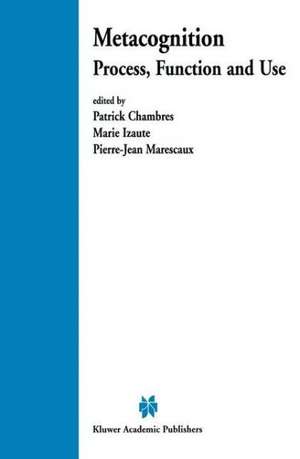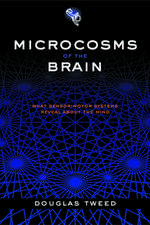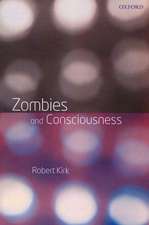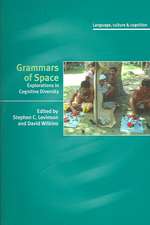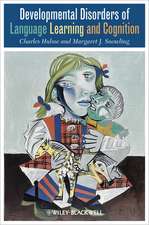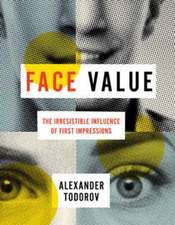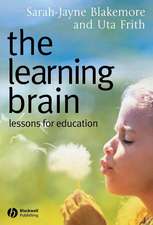Metacognition: Process, Function and Use
Editat de Patrick Chambres, Marie Izaute, Pierre-Jean Marescauxen Limba Engleză Paperback – 20 oct 2012
| Toate formatele și edițiile | Preț | Express |
|---|---|---|
| Paperback (1) | 944.82 lei 6-8 săpt. | |
| Springer Us – 20 oct 2012 | 944.82 lei 6-8 săpt. | |
| Hardback (1) | 952.26 lei 6-8 săpt. | |
| Springer Us – 30 aug 2002 | 952.26 lei 6-8 săpt. |
Preț: 944.82 lei
Preț vechi: 1152.22 lei
-18% Nou
Puncte Express: 1417
Preț estimativ în valută:
180.79€ • 188.76$ • 149.63£
180.79€ • 188.76$ • 149.63£
Carte tipărită la comandă
Livrare economică 05-19 aprilie
Preluare comenzi: 021 569.72.76
Specificații
ISBN-13: 9781461353942
ISBN-10: 1461353947
Pagini: 304
Ilustrații: XIX, 281 p.
Dimensiuni: 155 x 235 x 16 mm
Greutate: 0.43 kg
Ediția:Softcover reprint of the original 1st ed. 2002
Editura: Springer Us
Colecția Springer
Locul publicării:New York, NY, United States
ISBN-10: 1461353947
Pagini: 304
Ilustrații: XIX, 281 p.
Dimensiuni: 155 x 235 x 16 mm
Greutate: 0.43 kg
Ediția:Softcover reprint of the original 1st ed. 2002
Editura: Springer Us
Colecția Springer
Locul publicării:New York, NY, United States
Public țintă
ResearchDescriere
New Theory and Data on Metacognitive Monitoring and Control in Different Contexts and by Different Individuals Thomas O. Nelson University ofMary/and. USA This book, divided into several sections (each containing several chapters), is timely in reporting new theory and data that help refine what is already known about metacognition (defined as people's cognitions about their own cognitions). New data are reported about metacognition during learning (especially judgments of learning that occur soon after studying new items) not only in traditionally examined people such as college students but also in children and in Alzheimer patients. Data are also reported about metacognitive monitoring during the reading of text, not only in college students but also in children. The above situations focus on the acquisition of new items from lists or from texts. However, the book also includes a chapter reporting dataaboutmetacognitionduring problem solving. Besides the chapters on monitoring information in anticipation of future performance (sometimes called prospective monitoring), a chapter is included that offers data about the metacognitive monitoring ofthe retrieval of information from memory, where the emphasis is on the accuracy of retrospective confidence judgments not only in adults but also in children. This topic is ofwidespread interest both in traditional domains ofcognitive psychology and in applications to domains such as forensics, where eyewitness reports are crucial tojudicial decisions. The above topics pertain to aspects ofmetacognition involving the monitoringof one's own cognitions.
Cuprins
List of Contributors. Foreword. New Theory and Data on Metacognitive Monitoring and Control in Different Contexts and by Different Individuals; T.O. Nelson. Preface; P. Chambres, et al. Acknowledgments. Section I: Is Metacognition a Diverse Domain? 1. Metacognitive Judgments and their Accuracy; A. Koriat, et al. 2. The Systemic Nature of Metacognitve Experiences; A. Efklides. 3. Metacognitive Processes at Encoding; C.J.A. Moulin, et al. 4. Comparing Processing-based, Stimulus-based, and Subject-based Factors in Metacognition; C.A. Weaver III, W.L. Kelemen. Section II: What is Metacognition in Relation to Cognition? 1. Metacognition in Strategy Selection; M.Cary, L.M. Reder. 2. Feeling of Familiarity; S. Kinoshita. 3. Familiarity and the Retrieval of Memory Traces; G. Lories. Section III: When and How is Metacognition Effective? 1. When is Metacognition Helpful, Debilitating, or Benign? S.G. Paris. 2. The Role of Metatextual Knowledge in Text Comprehension; J.-F. Rouet, E. Eme. 3. An Ecological Approach to Metacognitive Regulation in the Adult; C. Valot. 4. Metacognition Triggered by a Social Aspect of Expertise; P. Chambres, et al. Section IV: What Can Nonexperts in Metacognition Offer to Metacognitive Research? What can metacognition offer to them? 1. The Metacognitve Implications of the Implicit-Explicit Distinction; Z. Dienes, J. Perner. 2. How Implicit is Implicity Acquired Knowledge; P.-J. Marescaux, et al. 3. Calibration of Confidence among Eyewitnesses and Earwitnesses; N. Olsson, P. Juslin. 4.Using State of Awareness Judgements to Improve Eyewitness Confidence-Accuracy Judgments; F.V. Seemungal, S.V. Stevenage. Varied Situations and Accuracy: Concluding Remarks; M. Izaute, et al.References. Author Index. Subject Index.
